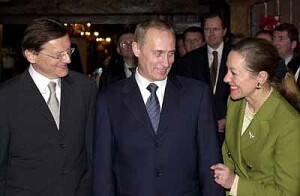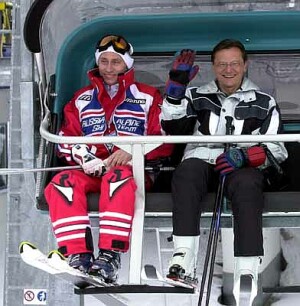Für all jene die sich in der Muttersprache der Fliegerei surfend hierher verirrt haben kurz eine durchaus kontroversielle Analyse der numehrigen Nachfolge-Situation nach dem Besuch des russischen Präsidenten:
As a service to all English-speaking surfers who hit that page in search for aviational subjects, here is a somewhat controversial summary of the current situation around the Austrian Draken-replacement after the visit of Vladimir Putin:
Russian President Vladimir Putin concluded the working portion of his visit to Austria on Feb. 9. First, Putin was successfully attempting to reinforce economic ties between Russia and Austria. Second, Putin sought very carefully to persuade Austrian leaders to retain the country's neutral status and refrain from NATO membership. Serving both initiatives was a Russian proposal to offer MiG-29SMT fighter jets as partial payment of Russia's $2.84 billion debt to Vienna, an offer that, if accepted is seen by Vienna as endangering any future Austrian accession to NATO.
It seems that the MiG offer was shot down before Putin's arrival, a victim of aggressive lobbying from the United States, Britain and Sweden. In the end, Putin was forced to reaffirm publicly that Russia would fulfil its international debt obligations and to acknowledge that Austria's neutrality and membership in international organisations were matters for Austria to decide. President Putin left Vienna for skiing with a 50 bill. ATS trade-volume in signed economic co-operation agreements - but with no order for RSK MiG.

Whilst signing large economic agreements the purchase of Russian aircraft could be reflected badly on Austria's political commitment to western military alignments. President Putin, Austrias councelor Wolfgang Schüssel and Ministry for foreign affairs Benita Ferrero-Waldner |
While strategically and economically painful, Russia's setback on the MiG proposal is only terminal. The attractive sounding Russian jets-for-debt proposal and the competing European and US offers will still face intense debate within the Austrian public and parliament. The majority of Austrians do not share their government's commitment to an eventual NATO membership, and in the end budgetary and political concerns could make Russia's offer too attractive to refuse. Russia had hoped the MiG sale would help partly solve its economic and strategic problems. Russia's foreign debt amounts to approximately $48.3 billion, of which it owes about $2.84 billion to Austria, according to Russian figures. Russia is counting on debt rescheduling and creative barter deals to cover the majority of its obligations.
Russia also needs to maintain strong economic ties with Austria, whose neutrality during the Cold War has made it an economic bridge between Western Europe and the former Soviet Bloc. Austria is Russia's 10th largest investor, with an estimated $170 to $200 million currently invested. According to the Kremlin, trade-volume between the two countries was $1.6 billion in 2000. Counting trade and investment, officials in Vienna judge Austria to be Russia's fourth largest commercial partner.
In addition, the MiG offer was an attempt to exploit Austria's immediate need for new fighter aircraft as a way to undermine the current cabinets long-term look towards NATO membership. Austrian cabinets has open-eyed allowed its military forces to deteriorate significantly since the end of the Cold War, and its army air division is backing against the wall. Austria is the only country still operationally employing a fleet of 23 Drakens, an aircraft designed in the 1950s, built in the 1960s and whose operational lifespan in Austria was planned until 1995, now scheduled to end in 2005 ! Austria has repeated delayed a decision on replacing the Drakens, in part due to budgetary constraints but largely because weapons systems selection has a great impact on Austria's undecided direction in future strategic relationships - particularly with NATO. The purchase of Russian aircraft could be reflected badly on Austria's political commitment to Western military alignments and the Staff sees its links with Western air forces threaten.

Budgetary constraints may force the Austrian government to accept the cheap Russian MiGs After signing a 50 bill. ATS trade-volume President Vladimir Putin and Austrias councelor Wolfgang Schüssel went skiing at St.Johann/Tyrol. |
Despite Russia's efforts, Austrian Defence Minister Herbert Scheibner categorically rejected the MiG proposal during a televised press conference on Jan. 14, and declared during Putin's visit that the reason for his opposition is the high maintenance costs of the MiG. As the minister was repeating the maintenance and technical concerns learned by the Germans and their old model 9.12, these are in truth mostly used as diplomatic rhetoric. The real roadblock to the Russian offer is NATO's opposition to the sale. There must have been intense pressure behind the scenes by the United States, Britain, and Sweden, who could easily argue that a MiG purchase would threaten Austria's future chances for entry into NATO. The alliance is open for Austria to join, as it could be critical in helping render the organisation's new borders more rational and defensible.

Austrian Defence Minister Herbert Scheibner |
While the deal is stalled yet, it is not dead. Russia is still strongly committed to the sale and is preparing to further sweeten the deal, for example by offering 32 aircraft for the price of 30. Moreover, the Austrian government may face stiff domestic opposition to alternative aircraft. It has openly linked its jet fighter purchase to a future security-doctrine towards international security-cooperation, but with NATO-tendencies the government holds a minority view in Austria. Austria's ruling coalition is not ruling-out the country's membership in NATO, while Foreign Minister Benita Ferrero-Waldner already declared that Austria is no longer neutral but rather non-aligned. The end of the Cold War brought chaos to Austria's doorstep, with Yugoslavia's collapse, in particular, threatening Austria with a spill-over of violence and refugees. Its neutrality has left Austria on the front lines with no allies around to back...
While polls show nearly two-thirds of Austrian population still support neutrality, the Austrian government has begun chipping away from the 1955 Neutrality Law, proposing a measure on the presence of foreign troops in Austria, which the opposition has vowed to challenge in Constitutional Court, if necessary. The left-green opposition has also publicly denounced the proposed tripling of the Austrian military budget as an impossible wishful thinking of a government aiming straight for NATO membership.
Time and domestic political pressures may still bring the Austrian government to force to revisit Russia's offer. All other fighters being equal in performance, many in the Austrian military reportedly prefer continuing Austria's longstanding and comfortable relationship with Sweden's Saab, while a purchase of its Gripens would allow Austria to avoid being caught between Russia and NATO. Though the Gripen is built to NATO standards, it is produced by a non-aligned country. But the Gripen will cost substantially more than the MiGs and their price, and explicit argueing with maintaining NATO compliance, could cause the opposition to torpedoe the deal entirely.
Unable to secure 30 expensive, NATO-ready aircrafts, the Austrian government may attempt to push-out to replacing the Drakens, but the ageing aircraft will not allow many more delays with the first squadron earmarked to cease in 2003. Unless Sweden could quickly offer JAS-39s at substantially reduced prices, the Austrian government may have no choice but to accept the cheap Russian MiGs, relying on German support and NATO's strategic need to keep Austria on the accession short list, despite the purchase. For the months to come, Austria will be in the eye of the twister of a heated domestic and international struggle around NATO closering and a publicly unbacked expensive arms-deal.